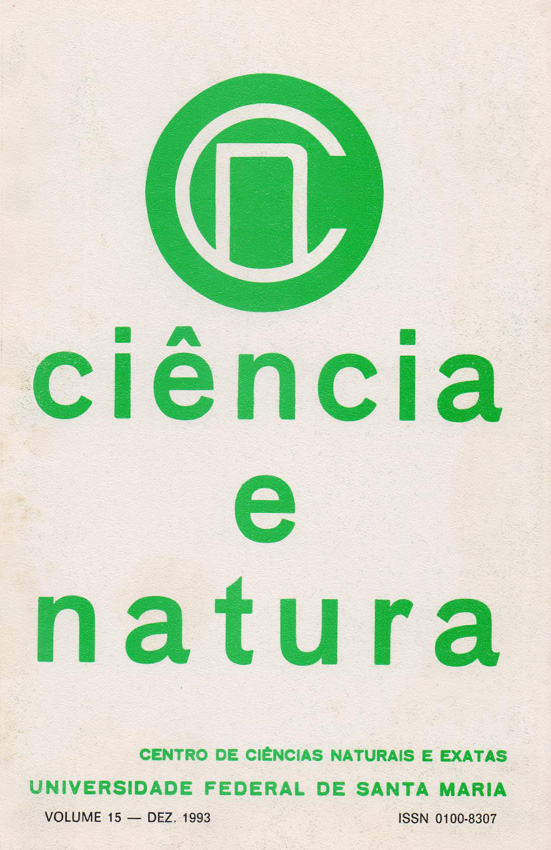The regional atmospheric circulation and the typical successions of weather during the winter of the Rio Grande do Sul State, Brazil
DOI:
https://doi.org/10.5902/2179460X26360Abstract
The mechanism of action of the extra-tropical and inter-tropical atmospheric systems during the winter in the Rio Grande do Sul State, Brazil, reflect the conditions of provisioning of polar air in the subantartic latitudes, the equilibrium of forces betwen the action centers, the efficiency of frontogenesis and the trajectories of polar fronts. From these factors of dinamic nature, appear combinations of types of wether grouped in three typical succesions models to the sul-rio-grandense winter. These models were obtained through the tecnique of rhythmic analysis and interpretation of sinothic maps and meteorological satellite images.Downloads
References
BARROS SARTORI, M. G. O clima de Santa Maria: do regional ao urbano. São Paulo, Departamento de Geografia da Faculdade de Filosofia, Letras e Ciências Humanas da Universidade de São Paulo, 1979. 167 p. (Dissertação de Mestrado).
_____ . Balanço Sazonário da participação dos sistemas atmosféricos em 1973, na região de Santa Maria, RS. Santa Maria, In: Ciência e Natura. (2): 41-53, 1980.
_____ A circulação atmosférica regional e as famílias de tipos de tempo identificadas na região central do Rio Grande do Sul. Santa Maria, In: Ciência e Natura. (3): 101-10, 1981.
INPE/CPTEC. Climanálise - Boletim de Monitoramento e Análise Climática, 5 (8): 1-35, São José dos Campos, São Paulo, Instituto Nacional de Pesquisas Espaciais! Centro de Previsão de Tempos e Estudos Climáticos.
MONTEIRO, C. A. de F. O clima da Região Sul. In: Geografia Regional do Brasil, Grande Região Sul. Rio de Janeiro, IBGE, v. 4., Tomo I, 1963.
_________ A Frente Polar Atlântica e as chuvas de inverno na fachada sul-oriental do Brasil. São Paulo, Instituto de Geografia da USP, 1969. Série Teses e Monografias, I.
_________ Análise rítmica em climatologia: problemas da atualidade climática em São Paulo e achegas para um programa de trabalho. São Paulo, Instituto de Geografia da USP, 1971, 21 p. Série Climatologia, I.
Downloads
Published
How to Cite
Issue
Section
License
To access the DECLARATION AND TRANSFER OF COPYRIGHT AUTHOR’S DECLARATION AND COPYRIGHT LICENSE click here.
Ethical Guidelines for Journal Publication
The Ciência e Natura journal is committed to ensuring ethics in publication and quality of articles.
Conformance to standards of ethical behavior is therefore expected of all parties involved: Authors, Editors, Reviewers, and the Publisher.
In particular,
Authors: Authors should present an objective discussion of the significance of research work as well as sufficient detail and references to permit others to replicate the experiments. Fraudulent or knowingly inaccurate statements constitute unethical behavior and are unacceptable. Review Articles should also be objective, comprehensive, and accurate accounts of the state of the art. The Authors should ensure that their work is entirely original works, and if the work and/or words of others have been used, this has been appropriately acknowledged. Plagiarism in all its forms constitutes unethical publishing behavior and is unacceptable. Submitting the same manuscript to more than one journal concurrently constitutes unethical publishing behavior and is unacceptable. Authors should not submit articles describing essentially the same research to more than one journal. The corresponding Author should ensure that there is a full consensus of all Co-authors in approving the final version of the paper and its submission for publication.
Editors: Editors should evaluate manuscripts exclusively on the basis of their academic merit. An Editor must not use unpublished information in the editor's own research without the express written consent of the Author. Editors should take reasonable responsive measures when ethical complaints have been presented concerning a submitted manuscript or published paper.
Reviewers: Any manuscripts received for review must be treated as confidential documents. Privileged information or ideas obtained through peer review must be kept confidential and not used for personal advantage. Reviewers should be conducted objectively, and observations should be formulated clearly with supporting arguments, so that Authors can use them for improving the paper. Any selected Reviewer who feels unqualified to review the research reported in a manuscript or knows that its prompt review will be impossible should notify the Editor and excuse himself from the review process. Reviewers should not consider manuscripts in which they have conflicts of interest resulting from competitive, collaborative, or other relationships or connections with any of the authors, companies, or institutions connected to the papers.







